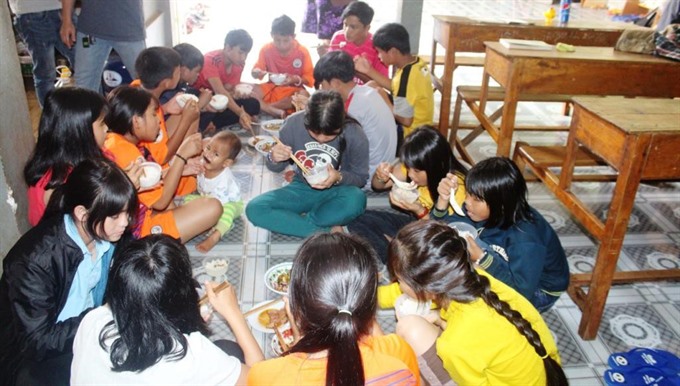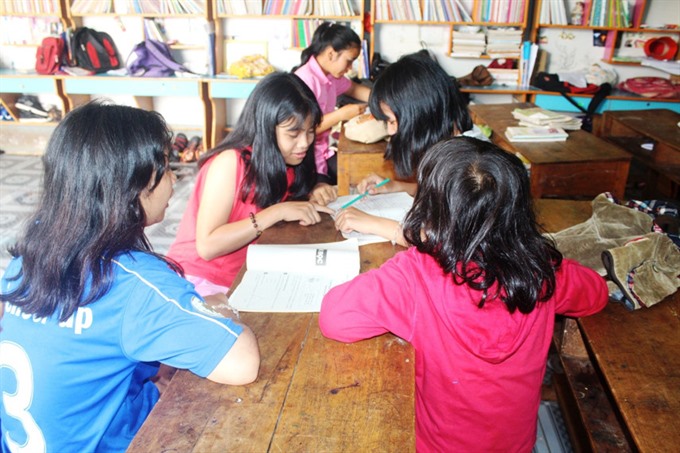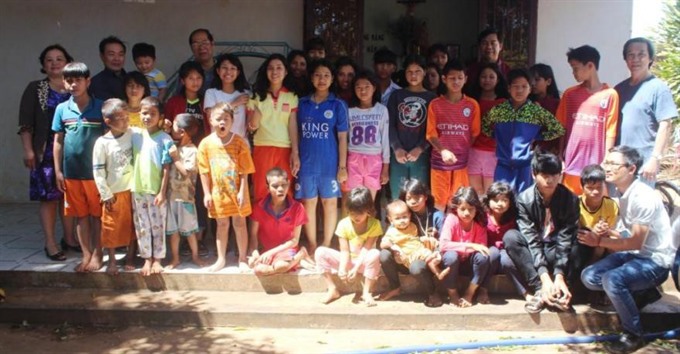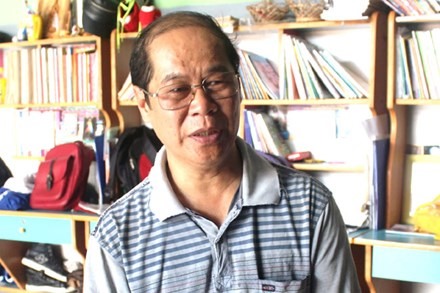 Society
Society

The sound of children reciting lessons aloud rings through the house of ‘teacher Nhật’ — as his 71 adopted children lovingly call him — located in the distant commune of Ia Hlốp, in the Central Highlands province of Gia Lai.
 |
| Some of the 71 children saved by Đinh Minh Nhật at lunchtime. — Photo courtesy of Đình Văn |
Đình Văn
CENTRAL HIGHLANDS — The sound of children reciting lessons aloud rings through the house of ‘teacher Nhật’ — as his 71 adopted children lovingly call him — located in the distant commune of Ia Hlốp, in the Central Highlands province of Gia Lai.
Some of the bigger kids help the younger ones learn, while others hang clothes out to dry on in the garden. The sound of laughter comes from a group of youngsters while setting out dishes and bowls for lunch.
It has been 9 years since Đinh Minh Nhật took in his first child. The 55-year-old man, having never married, is raising 71 children in the house that was passed down to him and which he has haphazardly extended and divided into several tiny compartments, with different areas for boys and girls. Sixty-seven of his children are of the Jrai ethnic minority, the remaining 4 are of the Kinh. The oldest is 16 and the youngest just 9 months old.
On a stormy, winter night in 2008, a two-day-old Jrai infant was about to be buried alive with her dead mother. An adult-sized grave and a smaller one had already been prepared. A shaman was invited to oversee the burial.
“She must die with her mother,” villagers screamed, as Nhật asked to take the infant with him. It had been a custom for thousands of Jrai generations that if a mother dies in labour or while the child is breast-feeding, her living child must be buried with her - a practice in which no relatives of the child have a say, not even the father. Not abiding by the custom would be in defiance of giàng (God of the Jrai).
 |
| Some of the 71 children saved by Đinh Minh Nhật help each other study at his house in Ia Hlốp Commune, Chư Sê District, Gia Lai Province. — Photo courtesy of Đình Văn |
Knowing that he alone couldn’t fight off hundreds of villagers, Nhật ran to the commune’s People’s Committee as fast as his legs could carry him and asked for help. After lengthy debate and persuasion, villagers finally allowed Nhật to rescue the infant, in exchange for an enormous pig and several amphorae of liquor to make amends with giàng. He named the infant after him—Đinh Hồng Phúc—meaning “a blessing”.
Carrying Phúc in his arms, Nhật circled the village for months asking for every single drop of milk to feed her. At the same time he was working to pay back the lenders who loaned him money to buy the ‘offerings’ to giàng.
The good intentions behind Phúc’s name were not reflected in the infant’s life. Phúc often fell ill, and Nhật made many visits to hospitals in Huế.
“Luckily for me, a group of nuns in the city learned about the child and said to me: ‘Let her live here with us, don’t make her travel back and forth in such conditions’,” Nhật said.
“Phúc is 9 now,” he said. “She’s in the third grade and has a strong Huế accent.”
Đinh Thái Bảo is the second child Nhật took in - a child born with no anus and Down syndrome, who was abandoned by his parents and found covered with ants and flies. Nhật heard his cries, taking him to a hospital in HCM City for colostomy surgery.
Nhật himself was struggling with a kidney disease at the time, but he spent all of his money on Bảo. The day the child fully recovered was also the day Nhật found himself without a penny to his name.
From then on, Nhật took in every orphan and homeless child he could find. His neighbours, on seeing abandoned children, would pick them up and take them to his house.
“Coming from different areas of the province, they didn’t get on well at first,” Nhật said of his children. “Now they take care of one another like siblings—sharing food and snacks, tucking each other in at night.”
 |
| The children saved by Đinh Minh Nhật at his house in Ia Hlốp Commune, Chư Sê District, Gia Lai Province. — Photo courtesy of Đình Văn |
Nhật’s compassion touched Lê Sỹ Quý, chairman of the commune’s People’s Committee. “Only a noble heart does that,” Quý said.
Over the years, Quý constantly called for support from humanitarians, organisations and individuals to donate clothes, food and necessities to help Nhật raise the children, as well as helping with necessary procedures to request that schools waive tuition fees.
However, since no donations last forever, it still fell on Nhật to provide for his children. To earn money, he helped farmers pick coffee and pepper during harvest season. When the season ended, he took care of inpatients at hospitals and saved the money their relatives paid to care for his children at home.
Not everyone approved of Nhật taking in homeless children, he said. Đỗ Thị Loan, former chairwoman of the commune’s People’s Committee, asked him to ‘dismiss’ his family, as she considered it to be an ‘illegal gathering of children’.
“She went to their schools and threatened to ban them if they kept staying with me,” Nhật said. This scared some of the children, and they skipped classes. Later on, Loan gave up her crusade after numerous objections from teachers.
 |
| Đinh Minh Nhật talks about his journey of raising 71 orphans and homeless children over the last 9 years. — Photo laodong.com.vn |
The situation was brought to the attention of the Division of Labour, Invalids and Social Affairs of Chư Sê District. The division offered to help Nhật apply for welfare for the 71 orphans, on the condition that he is able to present their parents’ marriage and death certificates.
“I picked them up from the streets; some of them were brought to me by strangers… How can I know who their parents are?” Nhật asked, after which the division’s officials left and never came back.
Siu H’Penn (born in 2002), one of the orphans saved by Nhật, said “’Teacher Nhật’ is very kind and thoughtful. He helped us study, he taught us to cook, to behave ourselves and to love one another.
“I want to become a doctor so that I can cure my siblings’ illnesses and help them get healthier,” she said.
Some of them suffered from heart conditions and pneumonia but he was too poor to provide them with proper treatment, Nhật said as he watched his children gather and help one another at lunchtime. Most of them do well at school, which is a blessing and a curse for Nhật.
“I can’t afford to get them through college,” he said.
“My only hope is that they get vocational training so that they can find jobs,” he said. “I hope they will be able to raise their own families.” — VNS




